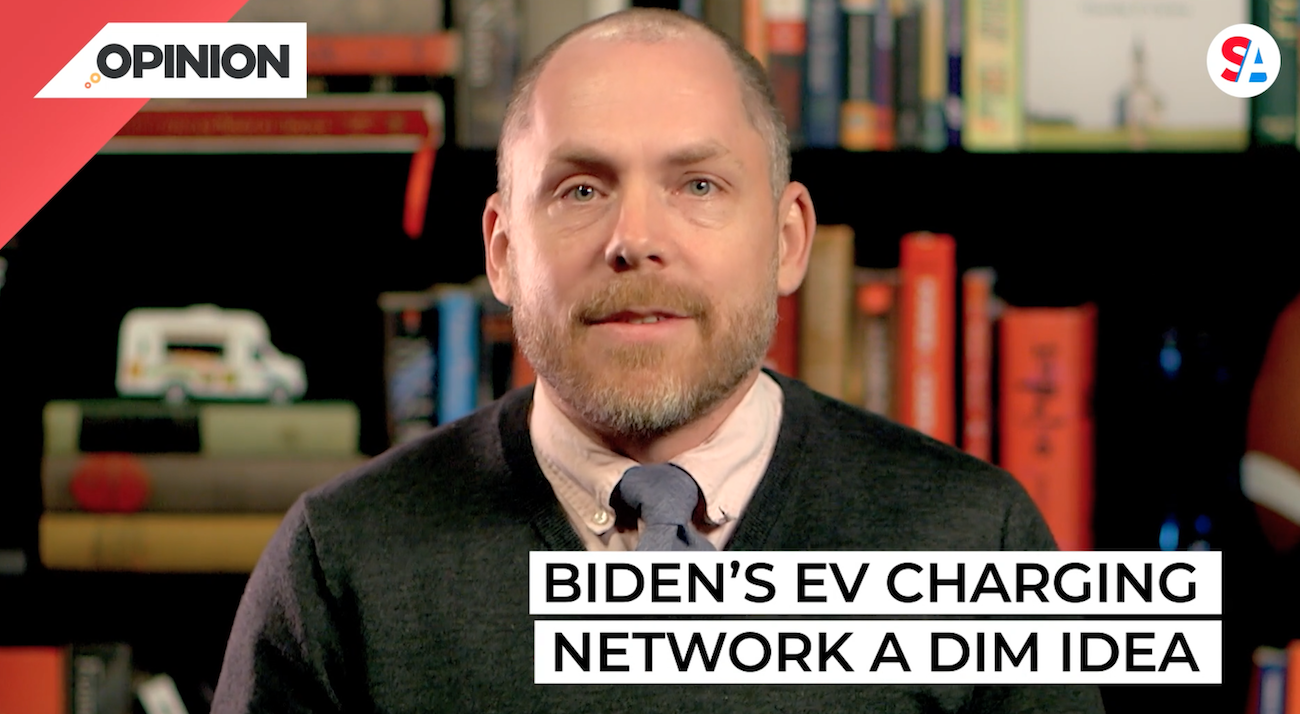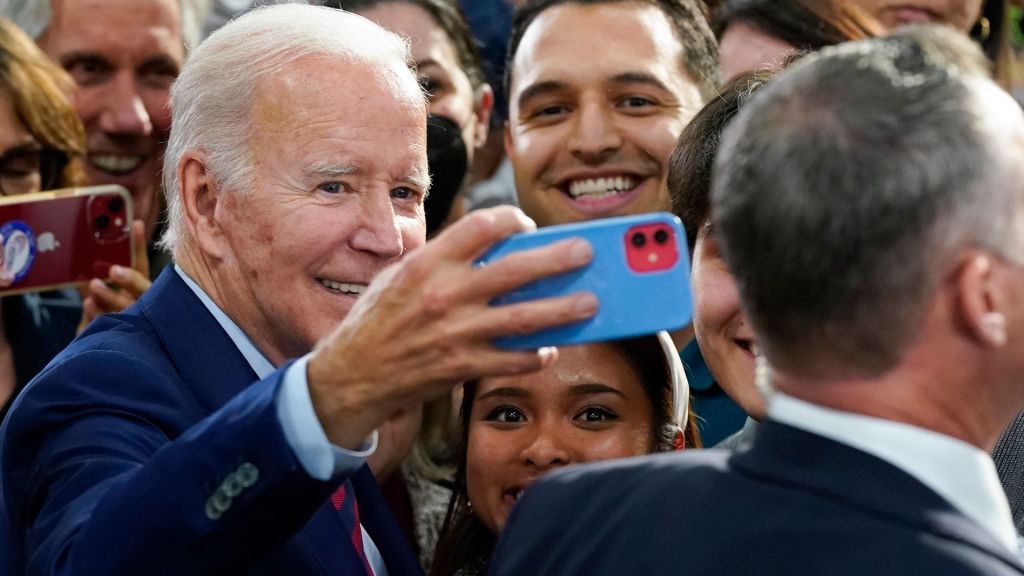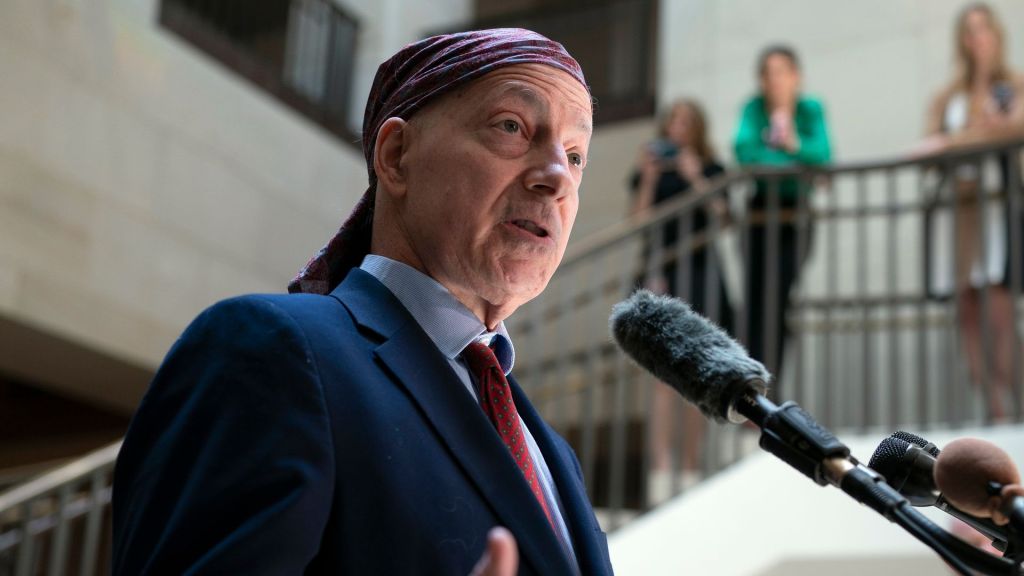
Commentary
-
Our commentary partners will help you reach your own conclusions on complex topics.
Coming soon to every part of America: A high voltage federal boondoggle—which is, frankly, a dim idea.
The plan is to spend billions to build chargers for electric cars.
A network of electric-car charging stations is a great idea. We have questions, though: Why does this plan involve building slow chargers instead of fast chargers, as Tesla has built?
The answer: Because the Biden administration is running the program, and they have decided that quantity outweighs quality.
The Bipartisan Infrastructure Bill that became law in November included $7.5 billion for building out a network of charging stations across the country.
But the charging stations they are planning to install are not rapid chargers, but slow ones—Level Two chargers, as they are called. These charge your car faster than you could by plugging in your car to a regular outlet in your house, but they still take an hour to give you enough charge to drive 25 miles.
Level Two chargers might help you refresh your battery while you’re doing your grocery shopping, but no network of them, however expansive, will enable you to take a road trip, because for every hour of driving, you’d have to do an hour of charging.
So why are Joe Biden and Kamala Harris building these slow chargers instead of rapid ones? Because during the campaign, candidate Biden promised half a million chargers.
To keep that promise, he has to go cheap.
The goal is to overcome a big consumer worry about electric cars: That you might run out of battery far more than a regular car will run out of gas. Slow chargers won’t overcome that fear, which means these billions may not do anything to increase electric car uptake.
It wouldn’t be the first time a dim idea became law and wasted billions of taxpayer dollars.
But there’s a bigger question here: Why is it a federal responsibility to install a bunch of chargers?
Sure, this is “infrastructure,” in a sense. But these aren’t highways, or railroads, or electric wires. Charging stations aren’t natural monopolies. They don’t require extensive rights-of-way.
A vehicle charger takes up less room than a hot dog cart and can be put in a parking lot.
There is no reason the private sector couldn’t foot the entire bill for these charging stations.
*Who* exactly would pay to build them? Well, let’s answer that question by looking at who lobbied Congress to subsidize the chargers. Those are the companies that stand to profit from this building spree.
First off, the stores that want the chargers in their parking lots have been lobbying on this. The National Association of Convenience Stores listed car chargers on their federal lobbying filings.
Berkshire Hathaway Energy—the power company owned by multibillionaire Warren Buffett—has lobbied on this issue, along with all the other power companies such as Edison Electric Institute and Exelon. Why? Because more charging means more electricity used, which means more money for Buffett, Edison, and Exelon.
Ford and General Motors are also lobbying for federally subsidized charging stations. They hope more stations will mean more electric vehicle sales.
A huge push to subsidize charging stations comes from a dedicated lobbying coalition called the Zero-Emissions Transportation Association. Their members include the companies that make the chargers, the carmakers, and other companies that would profit from this subsidy.
So if hundreds of companies are set to profit from this network of charging stations, and if they have already formed coalitions, why can’t these companies all build the charging stations themselves? That’s the way capitalism works: Investment comes from the companies that stand to profit.
Sadly, that’s not how Washington works. Special interests, instead of investing in innovation or infrastructure, invest in lobbyists, and they get politicians to force you, the taxpayer, to foot the bill.
So in the coming months, when you see these charging stations pop up, know that you paid for them. And if you have to plug your car into one of them, as they slowly recharge your battery, thank Uncle Sam for helping you develop the virtue of patience.
-
Subsidizing demand won’t fix real problems
The Biden administration recently announced an initiative to cap child care copay expenses for approximately 100,000 low-income working families in the United States. Instead of paying set fees, those families will pay 7% of whatever their total income is as a copay for the government-subsidized daycare program. The program also hopes to fully cover all…
-
America’s baby bust portends tough times ahead
In 2007, Americans welcomed approximately 4.3 million babies. But following a decline in birth rates during the Great Recession, birth rates have not recovered. Over the past 15 years, the number of U.S. births has decreased annually, with the most recent 12-month period on record indicating only 3.6 million babies born. Straight Arrow News contributor…
-
Inflation is still too high and Biden is still to blame
Democrats are busy celebrating a consistently strong economy under President Biden, citing shocking GDP growth and record-low unemployment. Republicans are responding to the celebration with concerns about rising living costs, housing unaffordability, and continuing inflation. Straight Arrow News contributor Tim Carney points out that many Americans feel left behind by “Bidenomics” and argues that they…
-
College just got much pricier for American families
American colleges and universities are among the very best in the world. They are also notoriously expensive, with many graduates working for decades to pay back their college loans. But for many new students and parents hoping to help their children pay for college, tuition just became even more expensive, thanks to a new federal…
-
Hunter Biden’s tax evasion charges not the worst part of controversy
On Dec. 7, Hunter Biden was indicted on nine tax charges in California, relating to over $1.4 million in taxes owed between 2016 and 2019. While the back taxes have been settled, a potential conviction could result in a maximum 17-year prison sentence for the president’s son. On Dec. 13, House Republicans voted to formalize…
Latest Opinions
-
 Getty Images
Getty Images
Biden uses NFL draft ad to try to connect with young voters
-
 Getty Images
Getty Images
Powering pot: Energy for US cannabis industry could electrify 13.5M homes
-
 Getty Images
Getty Images
Allies plan for Trump to have more control over interest rates
-
 Getty Images
Getty Images
FDA: Bird flu found in 1/5 commercial milk samples, suggests greater spread
-
 Reuters
Reuters
China permanently deploys warships to second overseas base
Popular Opinions
-
In addition to the facts, we believe it’s vital to hear perspectives from all sides of the political spectrum.


